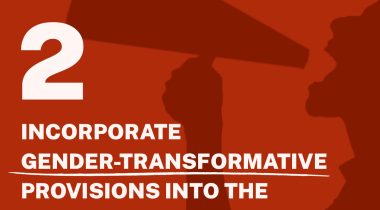George Turner ■ DFID’s work on international tax avoidance: in whose interest?

A new report by its own watchdog provides damning criticism of the UK government’s approach to tax as a development issue. At best, the government has ignored both international expertise and the views of the lower-income countries it claims to be helping. At worst, UK policy can be seen as pushing lower-income countries into supporting international tax rules that exacerbate poverty and inequality – and from which the UK government has itself has sought to benefit.
Such is the evidence presented that the government opens itself up to the possibility of a legal challenge over its failure to use aid for development aims, as required by legislation.
ICAI report
The Independent Commission for Aid Impact has released a report on the effectiveness of the UK government’s Department for International Development’s (DFID) efforts to tackle tax avoidance and tax evasion.
First the good news. Unlike many countries the UK sees the need to counter tax avoidance as a development issue. International tax is a priority area in the UK Aid Strategy and there is a government-led call to improve international assistance to tax authorities in developing countries. The UK is also the world’s largest donor in this area.
But that alone is no guarantee of progress. As no less a commentator than the new development minister, Priti Patel, wrote in the Daily Mail, “too often, [aid] money is spent without a proper focus on results and outcomes that allow the poorest to stand on their own two feet.”
The ICAI’s report cited real concerns with some of the ways that DFID have gone about its task, including what appear to be quite serious misallocations of funds and an approach which shows they failed to understand the task ahead of them.
What’s more, the ICAI’s criticism that the department failed to draw on expertise they had overseas, or to engage seriously with the increasing body of literature on how international tax policy impacts on developing countries suggests that the department did not have much intention of understanding the issue. Instead the department is over-reliant on analysis produced by the OECD – itself the subject of longstanding criticism for ignoring the concerns of lower-income countries, and promoting a global agenda that favours only its own members.
Northern solutions, southern problems
One of the areas of criticism levelled at DFID is the way in which they failed to take on board the priorities of developing nations when providing assistance to them.
Developing world tax authorities face a great number of issues, but DFID focused their assistance on implementing the G20 and OECD solutions to multinational tax avoidance – despite the exclusion of most developing countries from those clubs. UK aid money, in other words, was spent to encourage developing countries to adapt to international rule changes which may well be inappropriate for them.
One simple example ICAI picked out reflects that failing clearly:
“Many developing countries grant overgenerous tax incentives to multinational corporations in order to attract investors. If multinational corporations have little tax liability in the first place, it is unlikely that measures to prevent profit shifting will generate significant additional revenue.”
That is not to say that profit shifting in developing countries is not an issue, but it is the Tax Justice Network’s view that the solutions proposed by the OECD and G20 are very difficult to implement, even for well-resourced revenue authorities.
The bigger failing of DFID’s approach has been the absence of alternatives to the OECD approach. We have consistently argued for alternative models of taxing corporations that are much simpler and easier to implement, typically based on unitary approaches that reject the OECD myth of profit-maximisation by individual subsidiaries within a multinational group.
UK self-interest?
In addition to not getting their priorities right, the ICAI also raised concerns about whether DFID’s interventions were effective in the broader context of UK government policy.
Put simply, there is a concern that other branches of the UK government undermine any positive interventions made by DFID undermining the international tax system. The response of DFID to this criticism is that it is a non-issue. According to them:
“In light of the UK’s strong commitment to tax transparency, UK domestic policy and the international development agenda are already aligned”.
It is our view that the UK government position has little to do with transparency. If it did, they would support an intergovernmental tax body and other measures to ensure the inclusion of developing countries in policy generally, and in tax information mechanisms in particular.
As the ICAI pointed out, international tax policy is about more than just transparency. In particular the commission highlights a concern over the ‘tax competitiveness’ agenda pursued by the UK government. This agenda sees the country slashing corporate taxes and introducing rules which allow the UK to act as a tax haven for foreign profits. This creates opportunities for UK-based businesses to shift profits out of countries overseas, undermining international efforts to combat international tax avoidance and, of course, undermining the revenue base of those countries and their capacity to develop.
What is worse, the UK government appears not to want to even consider how their policies might impact international tax avoidance. As the ICAI reported:
“As the UK government representative on the G20 Development Working Group, DFID rejected calls from the IMF and the OECD to assess the ‘spillover impacts’ of UK tax policies on developing countries, reflecting the Treasury’s view that this would be impractical and time consuming.”
The ICAI concludes, damningly:
“we would have expected to see evidence of DFID taking active steps to understand how UK tax policies impact on developing countries, and on this basis, making informed judgments about whether to discuss possible areas of tension in cross-government dialogue. In the absence of any evidence of a structured decision-making process of this sort, we conclude that DFID is not actively pursuing policy coherence in the area of international tax.
It is moot whether this unwillingness reflects ideological conviction within government that UK policies benefit lower-income countries, so that supporting evidence is simply not required; or a real fear that any analysis would reveal the UK to be actively undermining the tax base elsewhere.
Wasted Aid
The report also picks up on some quite worrying examples of how development aid is being wasted. The example cited in the report has to do with the government’s own tax collection service, the HMRC. The department entered into an agreement with HMRC for them to provide training to overseas tax authorities. However, having taken the money, HMRC didn’t produce the goods.
“HMRC’s early use of funds was not good value for money. In the first year of the Capacity Building Unit, £1.17 million was spent on training HMRC tax experts for domestic roles in order to release existing staff for deployment abroad.
HMRC has never achieved more than half of its planned deployment. This highlights a key value for money risk as departments take on new aid delivery roles.”
We might add that the highly vaunted Tax Inspectors without Borders project – a version of an original TJN proposal of this title – has so obviously failed to respond to lower-income country concerns that it continues to struggle to attract ‘clients’.
Value for money?
The UK has been highly active (e.g. in the EU and OECD) in protecting its own policy preference of providing low effective tax rates for multinationals, and to procure profit-shifting from elsewhere.
The ICAI report demonstrates that too often DFID was unable to articulate their own policy preference that could have challenged some of the orthodoxy coming from the Treasury. Instead, having taken their lead on these issues from the OECD, whilst excluding the voices of developing countries, there is a clear risk that DFID may have promoted what the Treasury perceives as the UK interest rather than changes that would have been of benefit to development and poverty reduction.
This apparent conflict was seen most clearly at the Addis Ababa Financing for Development (FfD) summit in July 2015, where the UK (with France and the US) used great political force to ensure the defeat of G77 demands for a globally representative, intergovernmental tax organisation to replace the rich country club, the OECD, in this field. Any claims that DFID’s approach to tax issues was motivated by development, rather than ensuring developing country conformity with OECD approaches, suffered a grave blow to their credibility.
In addition, there are clear concerns over DFID’s performance – even on its own terms. It seems almost certain that the range of tax interventions would fail the Secretary of State’s narrow fixation on ‘value for money’ – offering, as they have done, no apparent benefit to countries’ ability to self-finance their own sustainable development strategies.
Alternative approaches would have reflected the international state of knowledge (for example, through the highly regarded International Centre for Tax and Development which the UK and Norway have funded); and the direct experience and intimate local knowledge of lower-income countries’ tax authorities. In addition, DFID could have assessed the impact of wider UK policy and made recommendations to its own government accordingly.
DFID’s legal mandate
Although the ICAI report is silent on this issue, the evidence presented raises another interesting question. Is any of this legal? Under the 2002 International Development Act the Secretary of State for International Development can only provide development assistance if she is satisfied that the assistance is likely to contribute to a reduction in poverty. Given some of the issues raised by this report, it is questionable as to whether DfIDs interventions on combatting international tax avoidance were truly motivated by that goal.
Related articles
One-page policy briefs: ABC policy reforms and human rights in the UN tax convention
Tax justice pays dividends – fair corporate taxation grows jobs, shrinks inequality

The “millionaire exodus” visualised
The millionaire exodus myth
10 June 2025
UN Submission: A Roadmap for Eradicating Poverty Beyond Growth
A human rights economy: what it is and why we need it

Do it like a tax haven: deny 24,000 children an education to send 2 to school

Incorporate Gender-Transformative Provisions into the UN Tax Convention
Just Transition and Human Rights: Response to the call for input by the Office of the UN High Commissioner for Human Rights
13 January 2025


